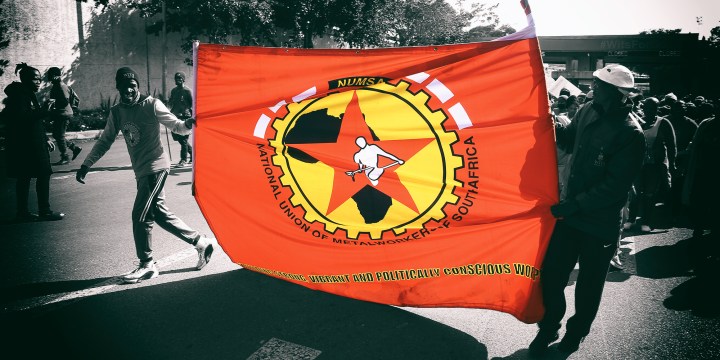PAY TALKS
NUM drops Eskom wage demand to 12% from 15%, but power utility stands firm on its (considerably lower) offer

The NUM has dropped its wage demands from Eskom to a 12% increase from 15%, while Numsa is sticking to 15%. However, Eskom has not moved the needle on its 3.75% offer.
There was at least some movement as the second round of wage talks between Eskom and a trio of unions representing more than 27,000 employees wrapped up late on Wednesday. But any deal is a long way off as the two sides remain poles apart.
Union sources speaking to Business Maverick on the sidelines of the venue where the talks were held said the National Union of Mineworkers (NUM) had dropped its demand for a 15% wage hike to 12%. But the National Union of Metalworkers of South Africa (Numsa) has not moved from its original 15% demand.
The sources said the power utility did not move on its original offer of a 3.75% increase. There were hopes late on Wednesday afternoon that Eskom would budge after it said earlier in the day that its initial offer remained on the table.
Read more in Daily Maverick: EXCLUSIVE: Eskom sticks to original wage offer of 3.75% in talks, unions dig in on their demands
But such prospects faded as the sun set and a fresh wave of rotational power cuts kicked in, briefly casting the venue itself into the dark.
The Solidarity trade union, which represents mostly skilled workers, is sticking to its demand for inflation as measured by the consumer price index (CPI) plus 3%, but it watered down some of the benefit upgrades it initially tabled. South Africa’s CPI was running at 7.1% in March.
“Eskom failed to read the room, there was a will to have some movement,” one union official told Business Maverick.
Unions were also angered by the fact that Elsie Pule, the chief human resources officer at Eskom, had failed to appear before the Standing Committee on Public Accounts (Scopa) in Parliament on Wednesday — as a stand-in for acting CEO Calib Cassim, who is in China — on the grounds that she was involved in the wage talks. But she failed to pitch at the negotiations.
Business Maverick also understands that Eskom has not pledged to come back with a counteroffer when the talks resume from 23 to 25 May, but has only promised to provide “feedback”.
The stakes are higher than a Springbok lock. The talks come as winter sets in and the rotating power cuts that are slashing economic growth, fuelling inflation and causing massive inconvenience for virtually every South African look set to worsen.
Unprotected walkouts
Eskom agreed to a 7% wage hike last year, a deal that came after frustrated workers at the power utility staged protests and unprotected walkouts.
In a financial presentation seen by Business Maverick, Eskom told the unions that its “financial position has deteriorated over a period of time, due to:
- Price of electricity that is not cost-reflective;
- Above-inflationary cost increases;
- Non-payment by customers;
- Deteriorating operational performance;
- Declining sales (expected to decline @ 0.5% pa); and
- An ambitious capital expansion programme.
The 2023 projection for net employee benefit costs, which includes salaries and wages, pension benefits, overtime and training, is seen reaching R33.3-billion.
In response to a Numsa request for information, Eskom said the “total employee benefit cost” for the more than 27,000 members of the bargaining unit was R17,561,914,171 for FY 2022/23. That equates to around R64,000 per month on average for employees in the bargaining unit, but it includes all benefits — not just the basic salary — including overtime which is 9% of such costs.
Meanwhile, the number of managers was put at 6,457 — about one manager per four non-managers. Looking at the numbers outlined in the financial presentation, that means that R15.8-billion in salaries and other benefits is paid to management. For managers, the average monthly total is almost R245,000 per month, or around R3-million a year.
Both figures conceal wide pay disparities within the bargaining unit and management ranks, and union officials complained that Eskom has not provided a detailed breakdown of management salaries.
The next round of talks in two weeks seem headed for a deadlock, and a dispute will probably be declared. The matter would then go to arbitration. Eskom employees cannot legally strike as their work is considered an essential service.
Sources from two of the unions involved in the talks said they believed Eskom wanted a dispute, but warned that could stir anger among the rank and file and potentially trigger a repeat of last year’s protests at a time when the grid is hanging on by a thread. DM/BM


















“about one manager per four non-managers”
Really? Then those managers aren’t working very hard. The normal span is double that, or more.